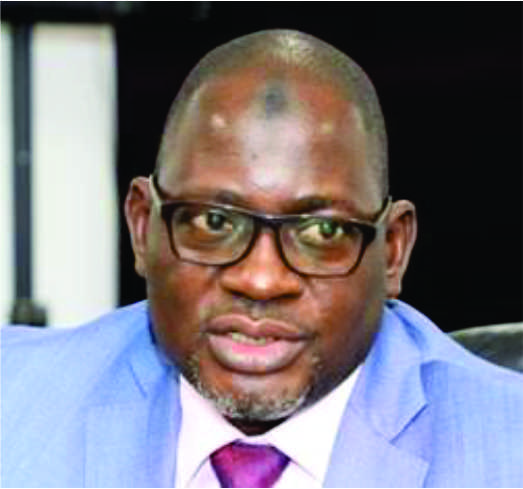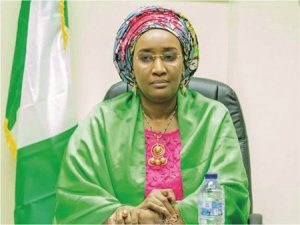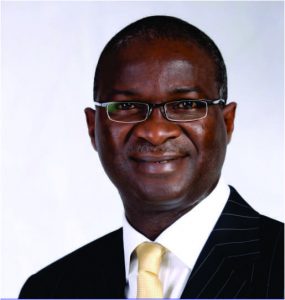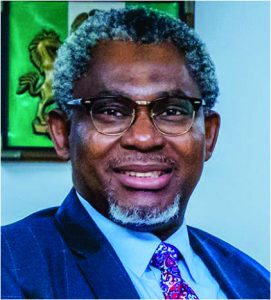
Dr. Muhammed Nami, executive chairman, Federal Inland Revenue Service [FIRS], is in charge of an expedient job of building tax revenue big enough to make up for volatile oil prices, meet huge debt servicing budget and yet empower President Muhamadu Buhari with the resources needed for development spending.
The President needs aggressive fiscal injection in public services and infrastructures to deliver on his promises under the Next Level Agenda. Increased non-oil income, led by tax revenue, has become imperative to provide the fiscal space. Nami is the man to produce the money needed for stimulatory spending with tax revenue.
His task is to change the reading from five years of missed tax revenue targets to a new regime where tax revenue is depended on to close the fiscal gap. It is a task in which he cannot afford to fail the government and the nation.
Nami understands that the responsibility placed on his shoulders is critical to the smooth operations of the various tiers and arms of government and by extension the well-being of all Nigerians and he is poised to perform. “We cannot therefore afford to fail in this regard”, he assured.
He has sustained the hopes so far. In the first full year in office in 2020, he narrowed down the gap between actual and target tax revenue from 40 percent in 2019 to 2.5 percent. With that, he has ushered in a new momentum in Nigeria’s tax administration.
Nami is a versatile tax administrative specialist groomed on the full cardinals of professional practice. He learned the needle and thread of every professional practice that has anything to do with how a model tax administrative system should run.
He has an all-rounder background with professional credentials that cover the entire waterfront of knowledge and experience needed to make a big difference at FIRS. His educational training cuts across a number of professional corridors from which he gathered a mix of knowledge and experience that have made him an authority in fiscal governance.
He studied sociology at the Bayero University Kano from which he crossed over to study business at post graduate level at Ahmadu Bello University, Zaria. He qualified as a professional accountant, added to that a practical working experience in auditing and topped up with specialist knowledge in taxation.
He has since set the goal for what is to be done at FIRS – which is to take Nigeria’s tax-to-GDP ratio from 6 percent to the World Bank-recommended threshold of 15 percent. That is the benchmark for Buhari’s economic growth and poverty reduction agenda to be realised. Nami is also set on a mission to slash Nigeria’s VAT gap from as high as 70 percent – one of the highest even by African standard.
He has defined the strategy for the goal, which is to transform the length and breadth of tax administration and compliance landscape in Nigeria. As soon as he came into office, he embarked upon a grand policy reform and institutional re-organisation.

He has unveiled an agenda of tax-driven solution to Nigeria’s earnings volatility. The agenda revolves around the application of technological innovations in the tax administrative machinery. This is in line with the global trend where deployment of appropriate technology has become an effective means of enhancing tax revenue.
He has constructed four cardinal pillars around which the effort to reposition the service for enhanced performance are anchored. The four-point agenda are rebuilding FIRS’ institutional framework, robust collaboration with stakeholders, building a customer-centric institution and making FIRS a data-centric institution.
Through the use of technology-based intelligence-gathering and information-sharing, he plans to plug the loopholes usually exploited by individuals and businesses to evade taxes. He has deployed technology in tax collection through innovative links to business premises using a central server.
The innovative step has lifted the agency’s tax revenue capacity, as all transactions that bear on taxes payable are captured directly as per the globally accepted standards. The task, Nami said, is to have everyone, who wants to benefit from the nation’s commonwealth, become contributors to the wealth of the nation.
The FIRS’ boss is therefore leading a major campaign aimed at turning tax evaders into national wealth builders. He is going about it by giving a human face to tax administration. He has unveiled a series of palliative measures designed to cushion the burden of tax compliance on taxpayers.
A major milestone attained by Nami’s leadership of FIRS in 2020 is his grand design to reposition stamp duty as the next major revenue growth driver for Nigeria. A good part of tax revenue capacity building strategy is billed to happen with stamp duty under Nami’s tenor at FIRS.
His regime at FIRS has attained great milestones in reshaping the nation’s revenue structure to prevent changes in crude oil prices from undermining budget performance and implementation of development projects.
Nami is progressively headed towards delivering the much-desired fiscal space that the President urgently needs to fulfill his promises to the nation under the Next Level Agenda.





